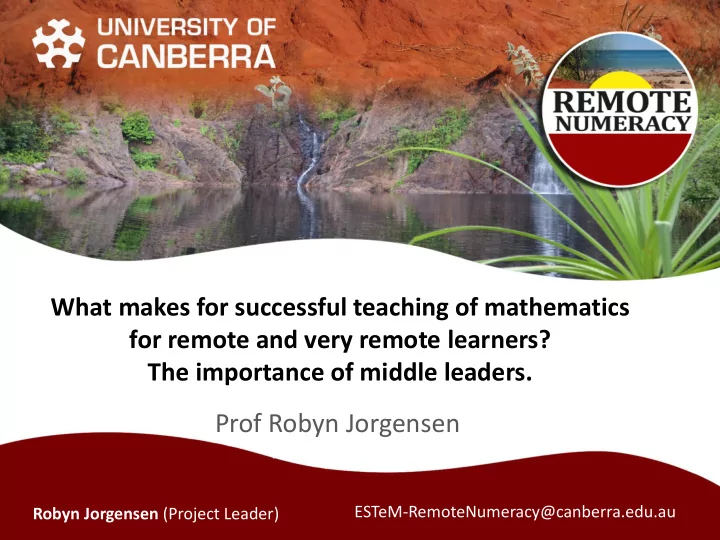

What makes for successful teaching of mathematics for remote and very remote learners? The importance of middle leaders. Prof Robyn Jorgensen ESTeM-RemoteNumeracy@canberra.edu.au Robyn Jorgensen (Project Leader)
Background • Funded by the ARC through the Discovery Grant Scheme • 32 case studies of successful remote schools • Schools are remote or very remote schools • Schools have at least 80% Indigenous learners • “Success” defined through NAPLAN, or by recommendation – schools supply data of their “success”
Project Intent • To identify what is working in remote Indigenous mathematics education • To develop case studies of successful practice to – Celebrate the work of those in the schools – Share with other teachers and schools • To identify trends (and differences) across schools • To describe, not evaluate, practices used in schools
Context • Schools are predominantly staffed by early career teachers – as practitioners as well as leaders • There is often a high turnover of teachers • Indigenous people are often employed in support roles for the classrooms and school • Professional development is difficult to access due to remote location • Schools vary in size, type, sector, location
Distribution of Schools Gov Catholic Indep To be Total sought WA 9 3 7 19 QLD 4 4 8 SA 2 2 4 NSW 3 2 5 NT 1 1 2 Total 18 3 8 9 38
Method • Ethnographic case studies – Interviews with the leadership team (vision, big picture) – Interviews with teaching and support staff (practice) – Interviews with community members – Observations of lessons – Productive pedagogy profiling – Collection of school documents • Development of individual case studies – Uploaded to project website • Development of macro analysis of project – Nvivo, Leximancer, statistical analysis
Model
Common Themes Topic Frequency Numeracy leadership 112 Aboriginal education workers 97 Language of the students 83 Community 61 Grouping students 61 Language of mathematics 53 High expectations 50 Activity based learning 47 Explicit teaching 44 Transience of teachers 40 Behaviour of the students 39 Making maths fun, enjoyable 39 Problems with attendance 38 Strategies to improve attendance 33 Worksheets, textbooks 32 Whole school planning 28 Consistency, routine, structure 22 Relationships with families, community 20
Roles of Middle Leaders • Conduit between the vision and leadership team and the enactment of practice at the classroom level. • Providing scaffolding for teachers to develop quality learning opportunities for schools • Provide senior leadership team with feedback and input into future directions • Make sense of the social, cultural and political context of the community in order to create learning opportunities for the Indigenous students • Build the skills and knowledge of the local people employed at the school
Characteristics of Middle Leaders • Have strong mathematical content knowledge • Have strong pedagogical content knowledge • Strong knowledge for differentiating learning • Require and build trust/respect/autonomy among the staff – leaders and teachers, Aboriginal teacher support staff
Professional Learning • The middle leader builds a common and consistent approach to teaching mathematics across the school – Inducts staff into the approaches used at the school – Provides exemplars of work – Provides feedback on teaching – Models the approach/es to teaching mathematics – Collects and uses student data to inform teaching – Supports teachers to understand student data and act on it – Develops differentiated teaching to cater for the diversity within a class – Works on the development of a consistent approach and plans across the school
Common Themes Topic Frequency Numeracy leadership 112 Aboriginal education workers 97 Language of the students 83 Community 61 Grouping students 61 Language of mathematics 53 High expectations 50 Activity based learning 47 Explicit teaching 44 Transience of teachers 40 Behaviour of the students 39 Making maths fun, enjoyable 39 Problems with attendance 38 Strategies to improve attendance 33 Worksheets, textbooks 32 Whole school planning 28 Consistency, routine, structure 22 Relationships with families, community 20
Challenges • Funding the role • Having the right person for the role • Supporting the learning of the Middle Leader – increasing the repertoire of skills of middle leaders – Remote support v/s face-to-face support
• Questions?
http://www.canberra.edu.au/resear ch/faculty-research-centres/stem- education-research-centre/research- projects/remote-numeracy
Recommend
More recommend